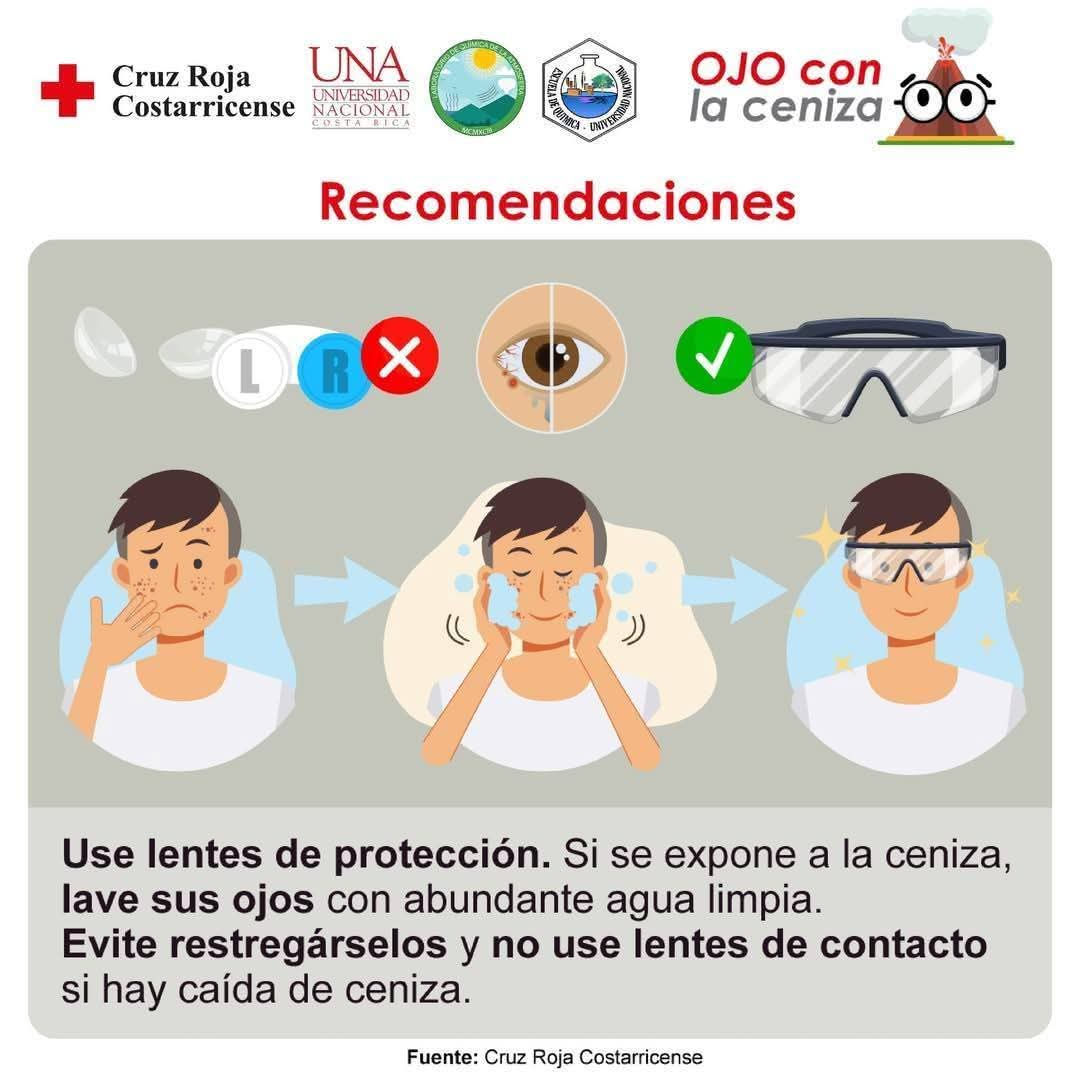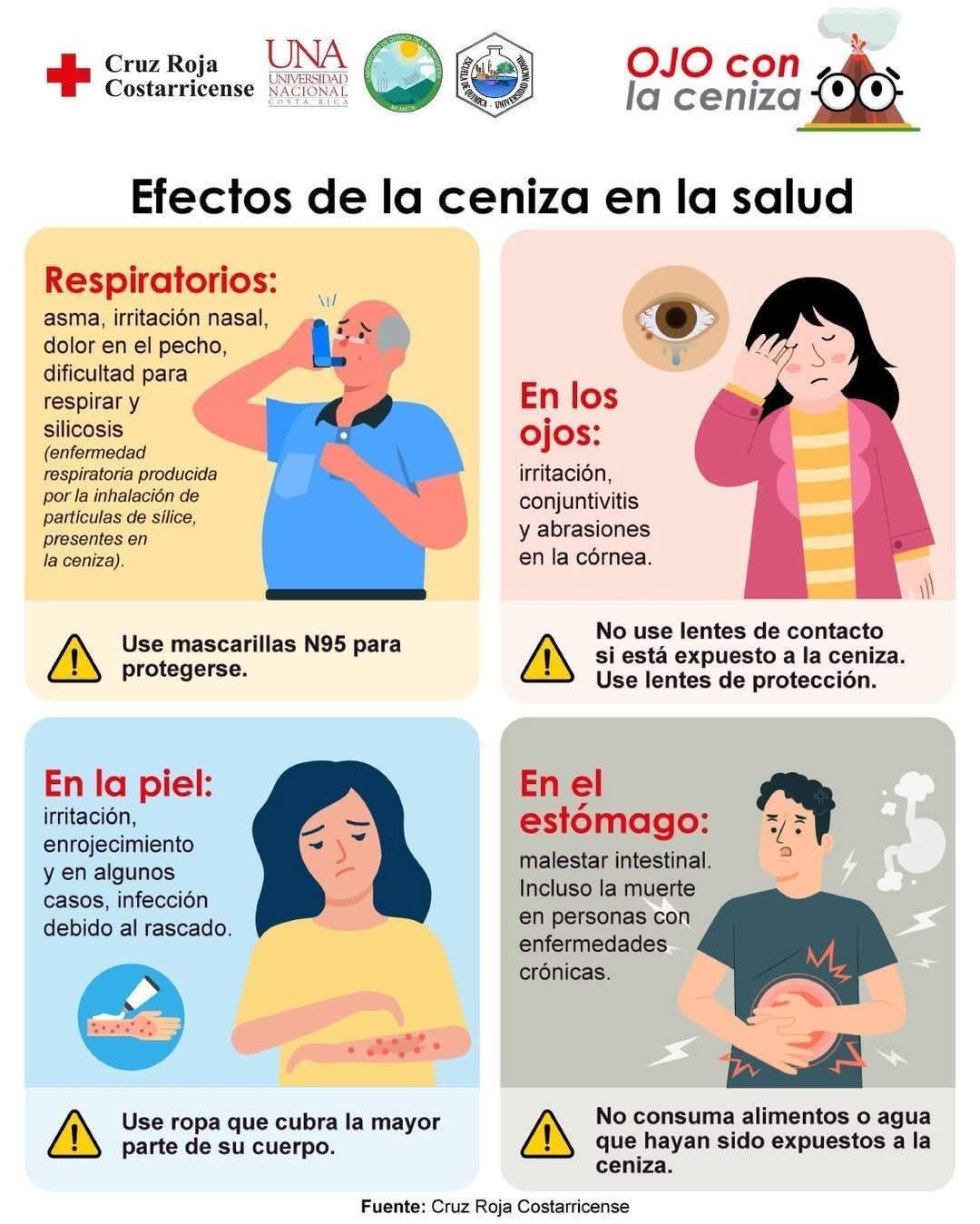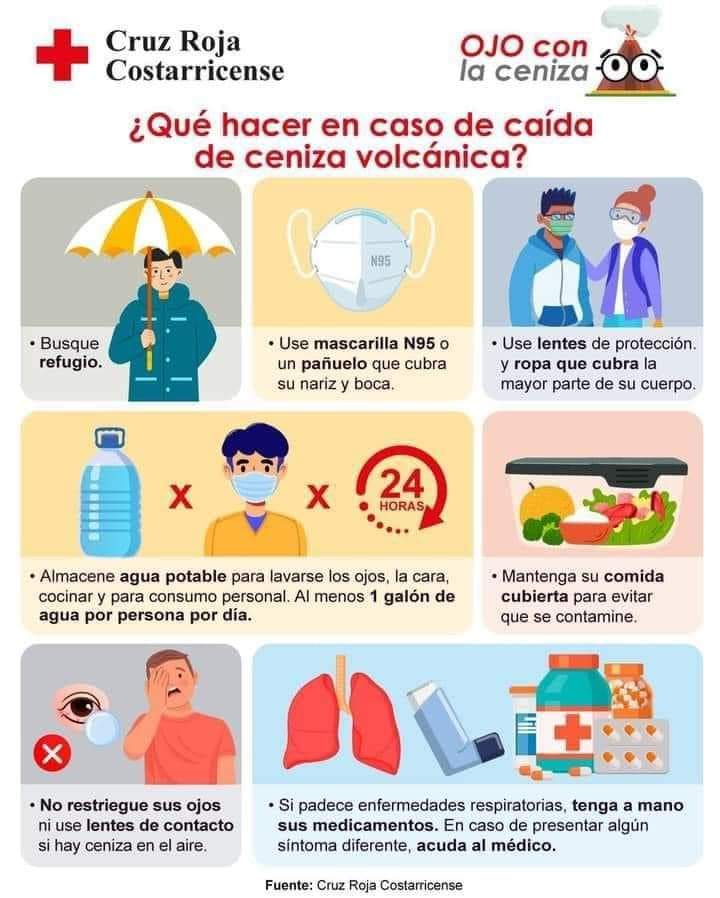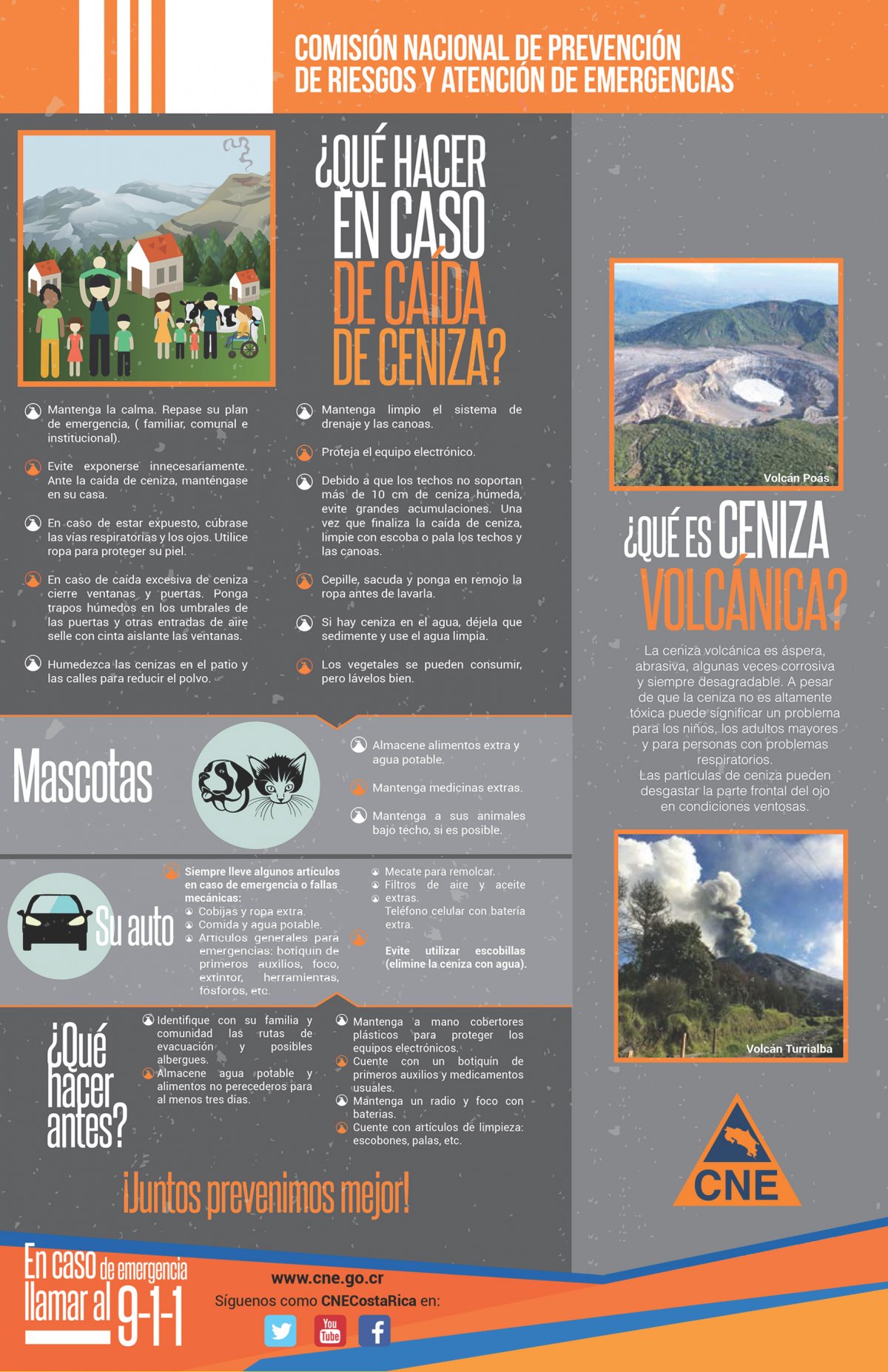Emergency Preparedness
We start here with current information about dealing with Volcan Poas and health/emergency measures you can take to protect yourself. From Costa Rica's Comision Nacional de Emergencias. Light translation in English included, but this would be a great time to beef up your Spanish skills.
Poas Ash Fall - Care
The Costa Rican Red Cross recommends that you take ash exposure seriously to minimize the physical effects this can have. Keeping doors and windows closed and pets inside are starting measures. You can also place a wet towel at the base of doors to help keep ash out of your home. It's not just ash that can be harmful - many people have worse symptoms from the sulfur gases. Consider using an N-95 mask inside your home at times when the odor is really strong.
2/5/2025



EMERGENCY PREPAREDNESS
From the Red Cross
- Protect yourself from ash by getting under cover - including using an umbrella if you have to be outside. Otherwise, seek cover under a roof or inside a building.
- Wear a mask - N95 - or use a scarf to cover your nose and mouth. Sinus headaches are a common reaction to ash and strong sulfur odors.
- Use protective glasses and wear protective clothing that covers the major parts of your body.
- Store potable water to wash your eyes, face, for cooking and for personal consumption. At least 1 gallon of water per person per day.
- Keep foods covered to avoid contamination.
- Don't rub your eyes or wear contact lenses if there is ash in the air.
- If you have respiratory issues, have your medications on hand. In case of your presenting new symptoms, contact your doctor.

EMERGENCY PREPAREDNESS
More advice from CNE
Click here for a PDF version of the flyer at left. It's a BIG file and may take a minute to load.
Stay calm. Avoid unnecessary exposure to ash. Stay inside. Keep doors and windows closed. Place towels at base of doors exposed to outside to keep ash out of the house. Cover windows. Wet down areas around the house/patio to dampen ash. Protect electronic equipment (cover computers/TV, etc). After an ashfall, clean roof and gutters. Brush or pre-soak clothing before washing.
Pets: Store extra food for them and be sure they have plenty of fresh clean water. Keep them inside if possible, under roof if nothing else. Be sure you have adequate medications for them.
Stay calm. Avoid unnecessary exposure to ash. Stay inside. Keep doors and windows closed. Place towels at base of doors exposed to outside to keep ash out of the house. Cover windows. Wet down areas around the house/patio to dampen ash. Protect electronic equipment (cover computers/TV, etc). After an ashfall, clean roof and gutters. Brush or pre-soak clothing before washing.
Pets: Store extra food for them and be sure they have plenty of fresh clean water. Keep them inside if possible, under roof if nothing else. Be sure you have adequate medications for them.
Autos: Keep the cars covered, and be sure to have an emergency ready-to-go kit - charged cell phone, water, medicines, extra oil and air filters, flashlight and batteries, extra clothes and blankets, ID and important papers - anything you would take with you if you have to leave in a hurry. Be prepared for 3 days for each person in your group.
Ash is abrasive and can be corrosive. Protect yourself!
Not a complete list, but a good start of things you should consider being prepared for as we head into another rainy season.
In Costa Rica you are liable to encounter torrential rain, lightning, flooding, earthquakes, landslides, volcanic actions... and that's just in your own neighborhood! Besides paying attention to your home and property needs, don't forget to give your vehicles the once-over before bad weather sets in - be sure you have the proper (and required) emergency-road kit on-board and that your vehicle is in good working order. Be Prepared!
We house this information here, which we appropriated from the US Embassy, for your quick reference.
In Costa Rica you are liable to encounter torrential rain, lightning, flooding, earthquakes, landslides, volcanic actions... and that's just in your own neighborhood! Besides paying attention to your home and property needs, don't forget to give your vehicles the once-over before bad weather sets in - be sure you have the proper (and required) emergency-road kit on-board and that your vehicle is in good working order. Be Prepared!
We house this information here, which we appropriated from the US Embassy, for your quick reference.
Determine Your Risk:
Find out today which types of wind and water hazards could happen where you live, and then start preparing how to handle them. Know if you live in an area prone to flooding and if you are safe to remain in your home in the event of a major storm. The first step to prepare for a hurricane is to stay informed about weather conditions. Monitoring local weather reports and alerts from the Costa Rican government can help determine your risk.
Assemble Disaster Supplies:
Whether you’re evacuating or sheltering-in-place,have the following items on hand to ensure your family’s basic comfort and well-being:
Water: at least one gallon per person per day for three to seven days, plus water for pets.
Food: at least enough for three to seven days, including: non-perishable packaged or canned food.
Water: at least one gallon per person per day for three to seven days, plus water for pets.
Food: at least enough for three to seven days, including: non-perishable packaged or canned food.
Radio: battery powered with extra batteries.
Blankets, pillows, etc.
First Aid Kit
Toiletries and medicatio
Flashlight and batteries
Pet care items
Blankets, pillows, etc.
First Aid Kit
Toiletries and medicatio
Flashlight and batteries
Pet care items
Strengthen Your Home:
Make sure your home is in good repair and up to local hurricane building code specifications to withstand wind impacts. Have the proper plywood, steel, or aluminum panels to board up the windows and doors.
If you’re a renter, work with your landlord now to prepare your home for a storm. This could include cleaning out roof and any other property rain gutters, trimming back potentially damaging tree branches, checking for loose debris around your property that could become airborne. For more information, please visit the National Hurricane Center and follow the advice of local authorities as provided on the Costa Rican National Committee on the Prevention of Risks and Emergency Attention website (please note this page is in Spanish language, but if you use the Google browser you can automatically translate the page to your language) or on Twitter.
It is important to be aware of other potential hazards in Costa Rica. Click here to go to the US Embassy page to see the most recent MASCOT message about crime in Costa Rica and protective measures. You can continually familiarize yourself with the local emergency services and procedures and stay up to date on any relevant travel advisories.
Updated 28/6/2024
